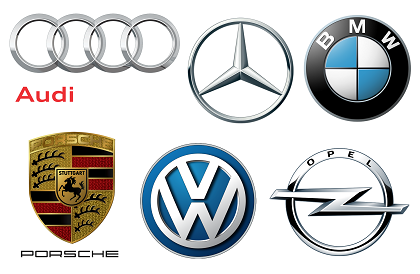
VIN Check Germany 🇩🇪
Thoroughly examine the VIN numbers of German cars before finalizing a purchase, especially for pre-owned vehicles. This helps you check accident history, odometer readings, market value, decode specifications, and understand the car’s full range of features.
Example VIN: WBA11AW090FN15037
(1462+ check reviews)
Why Germany Dominates the World Car Market and Why People are Buying Used Cars from There
When it comes to automobiles, Germany has long held a prominent position on the world stage. Known for its precision engineering, commitment to quality, and a proud heritage of automotive excellence, Germany is home to some of the most iconic car brands in history. But what makes Germany such a powerful player in the global car market, and why are people from around the world increasingly interested in buying used cars from Germany?
In this article, we’ll explore the factors that contribute to Germany’s dominance in the automotive industry and delve into why its used car market is so popular.
Germany’s Rich Automotive Heritage
Germany’s automotive history dates back to the late 19th century, with Karl Benz credited with inventing the first automobile in 1886. Since then, the country has built a reputation for producing high-quality, innovative vehicles that set industry standards. Renowned brands like Mercedes-Benz, BMW, Audi, Porsche, and Volkswagen are synonymous with German engineering prowess and luxury.

Why German Cars Stand Out
There are several key reasons why German cars are so revered worldwide:
- Precision Engineering: German cars are known for their meticulous attention to detail and precision engineering. The country’s engineering standards are among the highest globally, resulting in vehicles that perform well and last for years. For example, Mercedes-Benz models are celebrated for their reliable engines and long-term durability.
- Innovation and Technology: Germany is a leader in automotive technology. From pioneering safety features like Anti-lock Braking Systems (ABS) and airbags to advanced infotainment systems, German carmakers are often the first to introduce cutting-edge technologies.
- Luxury and Performance: Many German car brands focus on luxury and performance, offering a premium driving experience. Whether it’s a sporty BMW M Series, a luxurious Audi A8, or a powerful Porsche 911, German cars often outperform competitors in terms of style, comfort, and speed.
- Strict Quality Control: German manufacturers are known for their rigorous quality control processes. Each car undergoes extensive testing to ensure it meets high safety and performance standards. As a result, German cars are often more reliable and resilient.
- Global Demand: German cars are popular worldwide, with demand spanning from Europe to North America, Asia, and beyond. This broad market reach reinforces Germany’s position as a global automotive leader. Volkswagen, for instance, is one of the largest car manufacturers by volume, selling millions of vehicles each year.
Why Germany Dominates the Global Car Market
Germany’s automotive industry is highly influential, with several factors contributing to its success in the global market:
- Strong Economy and Skilled Workforce: Germany’s robust economy supports a well-funded automotive industry. Additionally, the country invests heavily in education and training, producing a skilled workforce that drives innovation and quality. German apprenticeship programs ensure that workers are well-versed in the latest automotive technologies.
- Government Support and Investment: The German government supports its automotive industry through various incentives, including tax breaks and research grants. This helps companies invest in R&D and stay competitive on a global scale. For example, the government’s focus on electric vehicle development has spurred growth in the sector.
- Commitment to Sustainability: In recent years, Germany has committed to sustainable practices in its automotive sector. This includes investing in electric and hybrid vehicles, reducing emissions, and improving fuel efficiency. Companies like Volkswagen and BMW have made significant strides toward electrification, further bolstering Germany’s reputation as a forward-thinking automotive hub.
- Strategic Position in Europe: Germany’s central location in Europe makes it a hub for automotive exports. With easy access to key markets, German manufacturers can efficiently distribute their vehicles across Europe and beyond. BMW and Mercedes-Benz have extensive distribution networks that reach virtually every corner of the globe.

How to check VIN code for Germany cars?
To check the Vehicle Identification Number (VIN) for cars in Germany, you should first locate the VIN on the vehicle, which is usually found on the dashboard near the windshield or on the driver’s side door jamb. Once you have the VIN, you can use various online services and databases that specialize in German vehicles. These services will allow you to enter the VIN and receive detailed information about the car, such as its manufacture date, model, engine type, and history of ownership or accidents. It’s important to use a reputable service, as this ensures the accuracy and comprehensiveness of the information provided. In Germany, the Kraftfahrt-Bundesamt (KBA) also provides resources for checking the history of a vehicle, which can be particularly useful for understanding its past within the country. Additionally, for a more thorough check, especially when considering the purchase of a used car, you can also consult a professional vehicle inspector who can verify the VIN and assess the overall condition of the car.
A used car is convenient to buy as close as possible because it would bewise to review it + Free VIN Check Europe first with your own eye or with a specialist. However, if thechoice of the home market remains small, it is worth looking abroad.
The purchase of a car from Germany or elsewhere in Western Europe isfavoured by a significantly higher choice and sometimes a slightly morefavourable sale price. In the interest of American cars, it is worthconsidering the possibility of importing a car into Europe from the USA.

Check any German or European car VIN code with our checker.
When you’re looking to buy a German or European car, whether new, used, or even a classic model, it’s essential to perform a VIN check. Our comprehensive VIN Checker or FIN nummer service provides detailed information about vehicles using our state-of-the-art decoder tool. With our service, you can quickly access complete reports for all makes and models, including new cars, used cars, classic cars, and motorcycles.
Information about German Vehicles
German produces many know brands like BMW, Mercedes VIN Decoder, Audi, Porsche etc
Unveiling the Vehicle’s Past: The Power of a VIN Check
A VIN, a unique 17-character code, acts as the automotive equivalent of DNA for vehicles. It holds the key to unlocking a car’s history, an invaluable asset for potential buyers.
Detecting Past Accidents and Damages
One of the primary benefits of a VIN check is the ability to uncover any past accidents or damage the car has endured. Websites like Carfax or AutoCheck provide detailed reports that include accident history, offering insights into the severity and nature of any incidents. This information is crucial, as it directly impacts the car’s safety and value.
Tracking Ownership and Service History
The VIN check also sheds light on the vehicle’s ownership history – how many people have owned it, the duration of ownership, and even the regions where it’s been registered. This trail of ownership, coupled with service and maintenance records, can reveal how well the vehicle has been cared for over its lifespan.
Ensuring Authenticity and Legal Compliance
Verifying Vehicle Authenticity
In a world where vehicle fraud is not uncommon, VIN checks serve as a guard against illegal activities like VIN cloning – where the VIN of a stolen car is replaced with that of a legal one. By checking the VIN, buyers can ensure the vehicle’s authenticity and avoid legal entanglements.
Cross-referencing VIN with Physical Inspections
It’s essential to cross-reference VIN report findings with a physical inspection of the vehicle. This includes verifying that the VIN plate on the car matches the one in the report and has not been tampered with. For a more in-depth inspection, services like Lemon Squad offer professional pre-purchase inspections.
Decoding Modifications and Recalls
VIN checks can also reveal any modifications made to the vehicle, which may not always be apparent during a physical inspection. Understanding these changes is vital as they can affect the car’s performance, safety, and insurance. Additionally, VIN reports can highlight any recalls or safety notices issued for the model, ensuring that all necessary repairs have been addressed.

What are German car portals?
For the German used car market, the trade-in value for vehicles is not primarily based on mileage or age, but on the production year.
There are some factors that make the German used car market different from other countries. The trade-in value for vehicles is not primarily based on mileage or age, but on the production year. This makes sense because cars in Europe are typically more expensive than they are in North America or Asia, and cars produced before 2004 will be cheaper than those made after 2004.
Mastering the Legal Maze - Buying and Importing a Car from Germany
For car enthusiasts and buyers around the world, Germany is a coveted source for high-quality vehicles. However, navigating the legalities of purchasing and importing a German car can be complex. This 500-word blog post aims to demystify the legal process, covering essential aspects like paperwork, taxes, and emissions standards.
Understanding the German Car Buying Process
Essential Paperwork and Documentation
When buying a car in Germany, the foremost step is handling the necessary paperwork, which includes:
- Fahrzeugbrief (Vehicle Registration Document): This is the primary document that proves ownership and provides detailed information about the vehicle.
- Sales Contract: A formal agreement between buyer and seller, detailing the terms of the sale.
- Valid Identification: A passport or national ID card is required for the transaction.
Pro Tip: Always ensure that the details in the Fahrzeugbrief match the actual specifications of the car.
Paying the Purchase Tax (Mehrwertsteuer)
In Germany, the Mehrwertsteuer (VAT) is a key part of any vehicle purchase. It’s typically included in the sale price, but it’s essential to confirm this with the seller.
Exporting a Car from Germany
Export Registration (Ausfuhrkennzeichen)
If you’re exporting the car, you’ll need to obtain export registration plates, which are temporary and allow you to drive the car out of Germany. This process involves:
- Insurance: Securing short-term insurance for the export period.
- Vehicle Inspection (TÜV Report): A recent inspection report is often required to obtain these plates.
Customs Clearance
Before exporting the car, it’s crucial to clear customs. This typically involves presenting the Fahrzeugbrief and sales contract, and possibly paying export duties, depending on your destination country.
Navigating Import Regulations in Your Country
Import Taxes and Duties
Upon arrival in your country, the vehicle will be subject to local import taxes and duties. These vary widely and can be a significant cost, so it’s important to research this in advance.
Emissions and Safety Standards
Another critical factor is ensuring the vehicle meets your country’s emissions and safety standards. Germany is known for high standards, but there may still be differences, especially in emissions regulations.
Resource: Websites like the European Environment Agency provide information on European emissions standards.
Registration and Insurance in the Destination Country
Once the car is imported, the next steps are registration and insurance:
- Local Registration: You’ll need to register the car in your country, which will require various documents, including proof of ownership and import duty payments.
- Insurance: Securing local insurance is a must before the car hits the road.
A Rewarding Journey with Due Diligence
Purchasing and importing a car from Germany involves a series of legal steps and considerations. From handling the initial paperwork and understanding VAT implications to navigating export and import regulations, each phase requires careful attention. By familiarizing yourself with these processes and planning accordingly, you can ensure a smooth and compliant import experience, bringing a piece of German automotive excellence to your doorstep.

What Is the German Used Car Market?
The German used car market is a sector of the car industry in Germany. It includes the trade and purchase of previously-used cars, as well as private and commercial car auctions. The used vehicle market in Germany is smaller than it is in other European countries, such as Spain and Italy, which has led to lower prices for second-hand cars.
If you’re looking to buy a used car, you’ll be able to find one at a German auction or by browsing classified ads online or through newspapers. Always check vehicle VIN code before buying.
How to Buy a German Used Car?
German used cars are in great demand, among the most popular are the BMW, Audi, Mercedes-Benz, Volkswagen, and Opel. It is especially advisable to buy a car through a rental company.
Buying a car in Germany should be done through a rental company. These companies have many different brands of cars available for sale including BMW, Mercedes-Benz, Audi and Volkswagen. It is very advisable to buy German cars because they are reliable and well-made.
Is it difficult to buy Used Car?
Some people might think that it is difficult to buy German used cars because of the language barrier but there are plenty of rental companies with English speaking staff or translations available on their websites. As long as one has good internet access and good knowledge of German it shouldn’t be too difficult to find what they need and make their purchase online.
Smart Finance Strategies for Importing Cars: Navigating Costs and Loans
Importing a car, especially from a country renowned for its automotive industry like Germany, is an exciting venture. However, it involves a considerable financial commitment. This 500-word blog post delves into the financing options, cost comparisons, and budgeting strategies for purchasing and importing a German car, guiding you through the economic maze of this process.
Understanding the Total Cost of Importing
Breaking Down the Expenses
The first step in financial planning is understanding all costs involved:
- Purchase Price: This is just the starting point. Remember, the listed price may or may not include German VAT (Mehrwertsteuer).
- Shipping and Insurance Costs: These can vary widely based on the shipping method and the insurance coverage you choose.
- Import Taxes and Duties: Depending on your country, import taxes can significantly increase the total cost.
- Compliance and Modification Costs: If the car needs modifications to meet local standards, this can add to your expenses.
Pro Tip: Use a Cost of Import Calculator to get a rough estimate of these expenses.
Exploring Financing Options
Personal Loans
For many, personal loans are a viable option. They offer flexibility in terms of how you use the funds, but interest rates can vary.
- Shop Around for Rates: It’s crucial to compare rates from various lenders to find the best deal.
- Consider the Loan Term: Longer terms mean lower monthly payments, but more interest paid over time.
Auto Loans
Some lenders offer auto loans specifically for car imports. These may come with more favorable terms compared to personal loans.
- Secured vs. Unsecured Loans: Secured loans typically have lower interest rates but require collateral, usually the car itself.
- Down Payment Requirements: Larger down payments can reduce your monthly payments and overall interest cost.
Budgeting for Your Import
Creating a Comprehensive Budget
Account for all foreseeable expenses, including the unexpected ones. It’s wise to set aside a contingency fund, typically 10-15% of the total cost, for unforeseen expenses.
Cost Comparison and Long-Term Considerations
- Resale Value: Consider the car’s resale value in your market. Some models hold their value better than others.
- Running Costs: Factor in the running costs, like maintenance, insurance, and fuel, especially since these can be higher for imported cars.
Navigating Currency Exchange and International Payments
Managing Currency Exchange Risks
If you’re paying in a different currency, fluctuations in exchange rates can impact the cost.
- Using Forex Services: Some Forex services offer tools to lock in exchange rates or alert you to favorable changes.
Making International Payments
Choose a reliable and cost-effective method for international payments.
- Bank Transfers vs. Forex Services: Compare bank transfer fees and rates with those of specialized Forex services like TransferWise or OFX.
Financial Planning Makes Perfect
Importing a car from Germany is an investment that requires thorough financial planning and research. Understanding all costs involved, exploring various financing options, and effective budgeting are key to making this process smooth and successful. With careful planning and the right financial strategy, you can make your dream of owning an imported car a reality without undue financial strain.
FAQ
What are the first steps to buying a second-hand car from Germany?
Begin by researching the German used car market online through platforms like Mobile.de or AutoScout24. Once you’ve identified a potential vehicle, contact the seller to inquire further and request detailed information, including the vehicle’s history, condition, and any necessary paperwork like the Fahrzeugbrief (vehicle registration document).
How can I verify the condition of a second-hand car in Germany before purchasing?
It’s advisable to arrange a pre-purchase inspection. This can be done through services like DEKRA, TÜV, or ADAC in Germany, which provide thorough vehicle inspections. Alternatively, you can hire an independent vehicle inspector or ask for a detailed video tour of the car if you cannot visit in person.
What paperwork is required when buying a used car in Germany?
Essential paperwork includes the Fahrzeugbrief (registration document), a valid TÜV report (vehicle inspection report), proof of ownership, and a sales contract. Ensure all documents are original and match the vehicle’s details. It’s also wise to get a copy of the car’s service history.
Are there any specific legal requirements for exporting a used car from Germany?
Yes, you will need export license plates (Ausfuhrkennzeichen) and international insurance if you plan to drive the car out of Germany. Also, complete any necessary customs export declarations. Consulting the German Federal Motor Transport Authority (KBA) can provide additional guidance.
How can I handle the payment securely when buying a car from Germany?
Use secure payment methods like bank transfers or escrow services. Avoid cash transactions, especially with private sellers. Always have a signed sales contract before transferring any funds, and ensure the contract details match the vehicle and seller’s information.
What should I know about shipping a second-hand car from Germany to my country?
Research and choose a reputable international vehicle shipping company. Decide between container shipping or Roll-on/Roll-off (RoRo) services based on your budget and the car’s value. Additionally, factor in insurance costs for shipping and check your country’s regulations regarding vehicle imports, including taxes, duties, and emission standards.
VINSPY Checker
VINSPY.eu offers VIN code checking service for Europe vehicles
Contact
Email: info@vinspy.eu